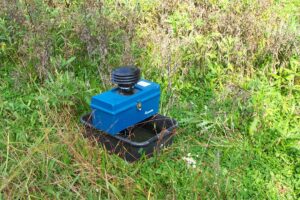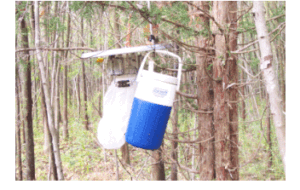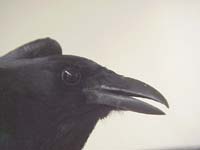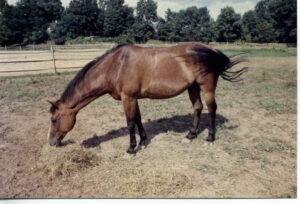Disease Surveillance
Mosquitoes are notorious carriers and transmitters of disease throughout the world. West Nile virus (WNV), eastern equine encephalitis, and dog heartworm are but a few of the many diseases mosquitoes can carry and pass on to other animals.
Surveillance for mosquito borne diseases is primarily done by catching adult mosquitoes with various traps and then testing for the specific disease being monitored for. In Warren County , trapping adult mosquitoes is done by utilizing an attractant (either light, carbon dioxide, or foul smelling water called stink water) to bring the WCMEC mosquitoes into the proximity of a battery operated fan collection device. The fan draws the mosquitoes through a tube into a net which is later collected.
Sample Handling and Prep
All samples are kept cold in containers with dry ice (temp -112 degrees F) until they can be stored in the ultra low temperature freezer at the Commission facility which holds the specimens at -112 degrees F. While the samples are identified under the microscope to Genus and species they are kept cold with a bed of dry ice to preserve any virus present. Mosquito samples of up to 75 specimens of any single species from a specific site from one collection day are grouped in a “pool”. The “pools” are then packaged for shipping to The NJ State Health Dept. for virus testing or tested in house utilizing a RAMP (Rapid Analyte Measurement Platform) testing system.
Trapping Methods
The types of mosquito traps and how they are used for disease surveillance include:
Gravid trap

WCMEC file photo
The gravid trap consists of a plastic tray filled with stink water (taken from a supply made in large garbage can with water, organic matter such as grass clippings and brewers yeast), a battery operated fan to draw mosquitoes up into a holding net and a cover for shelter. The trap runs for 12 to 18 hours from one afternoon to the next morning. The mosquitoes are then transported back to the lab on dry ice to preserve them.
Portable Light Trap with Carbon Dioxide

WCMEC file photo
A few different models of the portable light traps are used but they basically work the same way. A small cooler is used to contain the dry ice as it sublimates into a gas and attracts mosquitoes (simulating an animal’s breath). Some models have a small light as an additional attractant. As the mosquitoes draw, near a battery operated fan draws the mosquitoes down a tube into a net for holding. The trap is placed in the collection site for 12 to 24 hours after which time the mosquitoes are brought back to the Commission facility on dry ice for processing.
Avian Monitors

Photo: Dr. Lisa Reed, Rutgers University
Additional disease surveillance used to be provided by monitoring bird deaths. Members of the family Corvidae (crows, blue jays etc.) were particularly susceptible to West Nile virus. Hawk and owl deaths have also been used as an indicator of mosquito borne disease activity. However, the surviving bird population now has a health immunity to West Nile virus so they have lost their value as a sentinel. The health department still accepts dead bird reports but no longer collects the birds and the state laboratory no longer tests birds for West Nile virus.
Equine Involvement

Photo: Christine Musa
Sickness and/or death in horses, mules and donkeys can possibly be caused by mosquito-borne disease. West Nile virus and eastern equine encephalitis can cause severe illness and death in equines. There are vaccines that are available to provide protection against these diseases and are recommended. Suspect animals are tested and can indicate disease activity in an area. Follow-up adult mosquito trapping is done in these areas to determine the presence of disease carrying mosquitoes.
CURRENT VIRUS ACTIVITY
Warren County, NJ
Positive Birds (primarily crows): Previously, birds were reported to & collected by the Warren Co. Health Dept. 908-475-7960. Not all reported birds were suitable for testing. Birds suitable for testing were delivered by the Health Department to the NJ Public Health, Environmental and Agricultural Lab (PHEAL) for that virus testing. As of 2016, the NJ PHEAL is no longer testing birds for West Nile virus.
Positive Mosquito Samples: Mosquitoes are trapped throughout Warren County and samples are grouped (pooled) by species with up to 75 mosquitoes per sample. Mosquito samples are tested for West Nile virus, eastern equine encephalitis, Jamestown Canyon virus, La Crosse encephalitis, and other mosquito-borne viruses that may be circulating by PHEAL.
Horse Cases: The NJ Department of Agriculture monitors the horse population in the state for West Nile virus infections and follows the progress of those horses that have been made ill by the virus. Horse owners are encouraged to have their horses vaccinated to help protect them from West Nile virus.
Human Cases: The NJ Department of Health and Senior Services monitors for human West Nile virus infections. IN 2018, Warren County had its first human cases of WNV ever. There were 5 confirmed human cases of WNV that year but none since.
| Municipality | Positive WNV Mosquito Samples | WNV Horse Cases | Positive EEE Mosquito Samples |
| Allamuchy | |||
| Alpha | |||
| Belvidere | |||
| Blairstown | |||
| Franklin | |||
| Frelinghuysen | |||
| Greenwich | |||
| Hackettstown | |||
| Hardwick | |||
| Harmony | |||
| Hope | |||
| Independence | |||
| Knowlton | |||
| Liberty | |||
| Lopatcong | |||
| Mansfield | |||
| Oxford | |||
| Phillipsburg | |||
| Pohatcong | |||
| Washington Borough | |||
| Washington Township | |||
| Total | |||
| 1999-2024 Average | 12.96/year | 0.20/year | 0.20/year |
